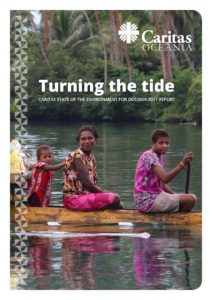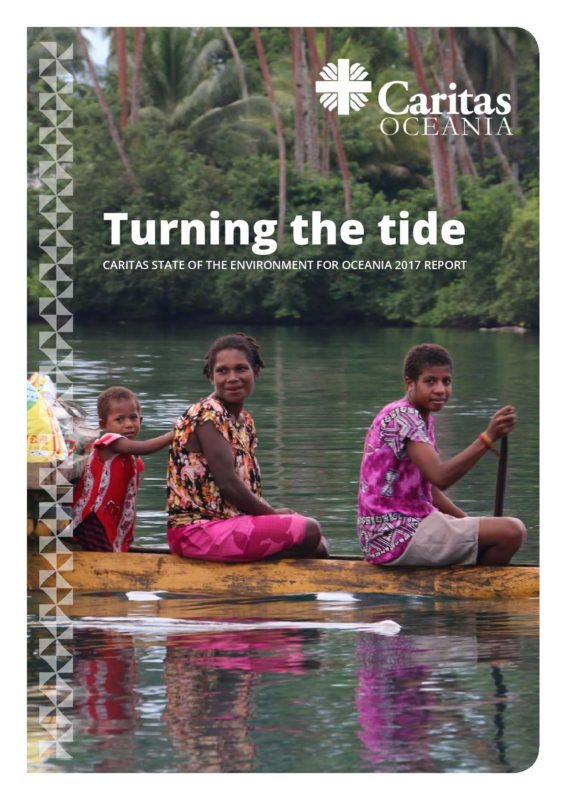Caritas Aotearoa New Zealand has called on the new Parliament of New Zealand to implement stronger policies and frameworks that take account of the impact of environmental degradation on the peoples of Oceania.
 The call came after the launch on the feast of St Francis, October 4, of Caritas’ fourth annual State of the Environment for Oceania report, Turning the Tide.
The call came after the launch on the feast of St Francis, October 4, of Caritas’ fourth annual State of the Environment for Oceania report, Turning the Tide.
Launched at Te Ngākau Tapu church in Porirua, this year’s report focuses on people’s changing relationship with the ocean.
Caritas director Julianne Hickey also called for “due diligence” to be given by Parliament “to research and particularly to the voices and the wisdom of indigenous peoples across our land and across Te Moana-Nui-a-Kiwa (the Pacific Ocean)”.
The conclusion to the report stated that there is “widespread evidence from Caritas sources of both slow onset and rapid onset coastal erosion arising from extreme weather and ongoing sea level rise — which may rise 1–2 metres by the end of this century”.
“Most places reporting coastal erosion say erosion has been going on for about two decades.
“Te Moana-nui-a-Kiwa (the Pacific Ocean) is changing dramatically: in sea level, chemistry, temperature and with plastics entering the food chain. Land use practices, overfishing and inappropriate fishing practices are also making an impact. “We are entering unknown territory.”
In her speech at the launch, Mrs Hickey referred often to the Pope’s writing on the environment.
“Pope Francis in Laudato Si’ said we need to seek other ways of understanding the economy and progress, and the human meaning of ecology. Both local and international policies need to address our throwaway culture and create pathways towards sustainable ways of living.”
The report conclusion also noted that “ . . .seabed mining poses a new threat, that will add to current stress”.
Chapter three of Turning the Tide concerns proposed offshore mining and drilling in Oceania. Caritas Papua New Guinea partner, Patrick Kituan, reflected on the legislative process around this, “Where the full impacts of new environmental activities are unknown, the precautionary principle and protection of the environment must take priority”.
In her speech, Mrs Hickey asked “for a moratorium on all seabed mining because we need to ensure there is adequate research behind environmental-related decisions and informed consent from communities prior to any activity, exploration or otherwise”.
The report also highlighted signs of hope such as the establishment of a new solar and wind power project spearheaded by Caritas in partnership with: New Zealand company, Powerhouse Wind; the Bishop Koete Rural Training Centre, Solomon Islands; and the New Zealand Government’s Ministry of Foreign Affairs and Trade. The Rural Training Centre had previously spent a sizable percentage of its budget on diesel for electricity. Now the clean energy is powering the entire facility both day and night.
The report conclusion stated that “global energy-related carbon dioxide emissions have actually stabilised in the last three years, even as the global economy has grown”.
“Our stories show when people come together and identify what is important and prepare for change, with the necessary help and support, they can turn the tide.”
Mrs Hickey also spoke in Christchurch about the findings of the report as part of the Icefest Public Lecture series. She said, “We have one global ocean and we need to be conscious of ways in which our relationship with water in Oceania may affect wildlife in Antarctica, as well as life elsewhere”.
Caritas Aotearoa New Zealand will join the international Caritas delegation at the 2017 United Nations Climate Conference in Germany, which is being chaired by Fiji. Mrs Hickey will present the findings from Turning the Tide there.
She said: “It is an opportune time for Oceania’s voices to be heard loudly and strongly. Representing Caritas Oceania, we will be taking these voices from our region and we will hold governments accountable. We will reinforce our call for stronger action on Sustainable Development Goal 14, to conserve and sustainably use the oceans, seas and marine resources”.
The report, Turning the Tide, is available via email and online at www.caritas.org.nz/ state-environment.

Reader Interactions